Russia Ukraine war live updates: Huge blow to Putin’s forces as they are forced to retreat
The Russian advance on Kyiv has taken a dramatic turn with signs Moscow may know it can’t beat the Ukrainians; Vladimir Putin takes aim at “unfriendly countries”.
The Russian army has retreated more than 30 kilometres east of Kyiv in the past 24 hours and has begun to establish defensive positions on several fronts in Ukraine, a senior Pentagon official says.
“The Ukrainians have managed to push the Russians back 55 kilometres east and northeast of Kiev,” the senior official, who requested anonymity, told reporters.
“That is a change from yesterday.” On Tuesday the Pentagon had estimated that Russian forces were around 20 kilometers from the center of the capital.
The official said that meant the Russians had retreated another 1okm - and were now “digging in”.
“They’re basically digging in and they are establishing defensive positions. So it’s not that they’re not advancing. They’re actually not trying to advance right now.”
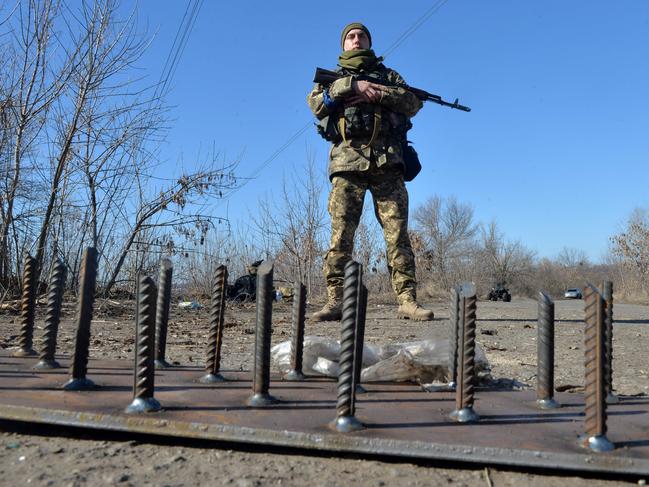
Russian forces also remain blocked 10 kilometres from the center of Chernihiv, northeast of Kiev, according to Pentagon estimates.
They are “stalled” and in some places “they are ceding ground, they are actually moving in the opposite direction, but not by much,” the official noted.
While in Kharkiv in the east, where fighting remains intense, Russian forces are still 15 to 20 kilometres from the city center and face “very, very stiff resistance” from the Ukrainians’.
The Russians appear to be focusing on the pro-Russian separatist regions of Donetsk and Luhansk in the east.
The official said the Pentagon believes Moscow is “at least to some degree trying to fix Ukrainian forces” in that area “so that they can’t be used elsewhere.” To the south, however, the Russian Navy is using the port of Berdyansk on the Sea of Azov for refuelling.
PUTIN DEMANDS RUBLES FOR GAS
Russian President Vladimir Putin said Russia will only accept payments in rubles for gas deliveries to “unfriendly countries”, which include all EU members, after Moscow was hit by crippling sanctions over its brutal Ukraine invaaion.
Immediately after his announcement, the ruble - which has plummeted since the start of the Ukraine conflict - strengthened against the dollar and euro, while gas prices rose.
“I have decided to implement a set of measures to transfer payment for our gas supplies to unfriendly countries into Russian rubles,” Mr Putin said during a televised address.
He insisted though Russia will continue supplying the volume of gas outlined in its contracts.
Mr Putin ordered Russia’s central bank to implement the new payment system within a week, saying it must be “transparent” and will involve the purchase of rubles on Russia’s domestic market.
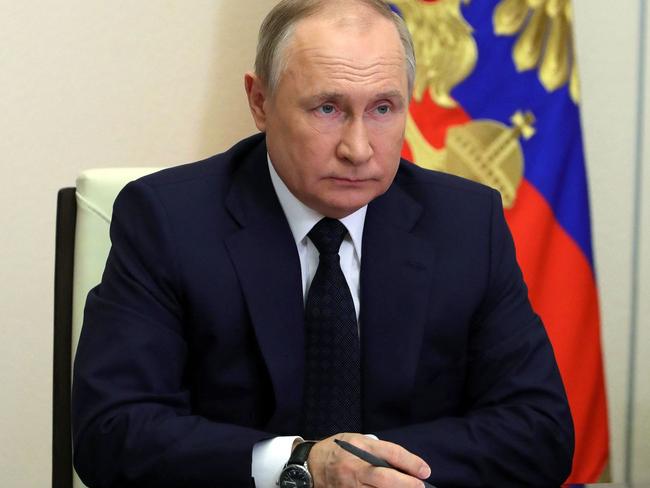
He also hinted that other Russian exports may be affected. Later Wednesday the Russian space agency Roscosmos announced it too will insist its international partners pay it in rubles.
“We will also conclude all our external agreements in rubles,” Roscosmos head Dmitry Rogozin was quoted as saying by the official Tass news agency.
“It is clear that delivering our goods to the European Union, the United States and receiving dollars, euros, other currencies no longer makes sense to us,” Mr Putin said.
Ukraine was quick to denounce Russia’s “economic war” on the EU and its efforts to “strengthen the ruble”.
“But the West could hit Russia with an oil embargo that would cause the Russian economy to plunge,” Ukrainian presidential advisor Andriy Yermak said on Telegram.
“This is now a key economic battle, and the West must collectively win it,” he said.
BIDEN ARRIVES IN EUROPE
US President Joe Biden has arrived in Europe on a high stakes trip to Brussels that will put to test his leadership of a newly united West after declaring that he’s “on my way ...(to) ensure Putin pays” for Russia’s brutal offensive on Ukraine.
As he left the White House early Wednesday, Biden appeared intent on using his last-minute wartime visit to Europe – where he will attend summits of NATO, the G7 and European Union on Russia’s invasion of Ukraine – to send a message.
I’m on my way to Europe to rally the international community in support of Ukraine and ensure Putin pays a severe economic cost for his war of choice. pic.twitter.com/4UJpyitOko
— President Biden (@POTUS) March 23, 2022
Asked what he’d say to Western allies about how to end the bloodshed in Ukraine, Biden said he’d wait to deliver it face-to-face.
“All I have to say, I’m going to say it when I get there,” he said before boarding a seven-hour flight to Belgium.
Biden’s visits to Brussels and Poland could still underscore the alliance’s limits in ending Russian President Vladimir Putin’s war, with Western leaders struggling to find ways to halt it.
So far, punishing Western sanctions haven’t stopped Putin, and it’s unclear whether the new steps expected this week — including sanctions on hundreds of members of Russia’s lower legislative body and changes to NATO’s force posture along its eastern edge — will be different.
President Biden is on his way to Europe to meet with our allies and partners in response to Putin’s brutal war in Ukraine. Amanda Sloat from @POTUS’s National Security team previews his trip: pic.twitter.com/MlsGPIs13l
— The White House (@WhiteHouse) March 23, 2022
National Security Advisor Jake Sullivan said aboard Air Force One - while it was en route to Brussels on Wednesday - that new sanctions will be announced against Russian “political figures” and the wealthy elite close to known as oligarchs.
“We, the United States, will announce a package of sanctions designations tomorrow that relate both to political figures, oligarchs,... as well as entities,” he said.
Sullivan said Western partners were also looking to “coordinate on sanctions enforcement so that Russian efforts to evade the sanctions can be dealt with effectively.”
Ukrainian President Volodymyr Zelenskyy said on Wednesday that almost 100,000 people remained trapped by relentless Russian bombardment in Mariupol without water, food and power.
Tens of thousands of residents have already fled the southern city, bringing harrowing testimony of a “freezing hellscape riddled with dead bodies and destroyed buildings”, according to Human Rights Watch.
The mayor of Kyiv, former world heavyweight boxing champion Vitali Klitschko, said Ukrainian forces were pushing the invaders back in several areas around the capital.
“We are ready to fight for each building, each street, every part of our city,” he told reporters. “We would rather die than kneel in front of the Russians or surrender to the invaders.”
Andriy Yermak, a top Adviser to Zelenskyy, said Ukraine was holding out “with superhuman courage”.
“But we cannot win a war without offensive weapons, without medium-range missiles that can be a means of deterrence,” Yermak said.
During a phone call on Wednesday, Prime Minister Boris Johnson told Zelenskyy of his “intention” to use Thursday’s G7 and NATO meetings to “substantively” increase defensive lethal aid to Ukraine, a Downing Street spokesperson said.
“The Prime Minister set out his intention to use tomorrow’s G7 and NATO meetings to increase the pressure on Vladimir Putin’s regime and work with partners to substantively increase defensive lethal aid to Ukraine. Leaders would look to address Ukraine’s requests and ensure President Zelenskyy is in the strongest possible position in ongoing peace talks,” the spokesperson said following the call between the two leaders.
NEW NUCLEAR WARNING
The International Atomic Energy Agency says it is “gravely concerned” about the “safety and security of nuclear facilities” in Ukraine.
Director General Rafael Mariano Grossi said in a video statement there was an urgent need to provide technical support to the the nuclear facilities, which include 15 reactors a well as the Chernobyl site.
“I have personally expressed my readiness to immediately come to Ukraine to conclude such an agreement, which would include substantial assistance and support measures, including on-site presence of IAEA experts at different facilities in Ukraine, as well as the delivery of vital safety equipment,” he said.
Mr Grossi said a “positive outcome still eludes us” after intensive consultations for many days...the need to prevent a nuclear accident becomes more pressing with each day that passes”.
Russian forces took control of the Chernobyl site on February 24.
UKRAINE MAKES SHOCK GAINS
Russian forces may only have three days of food, ammunition and fuel left as Ukraine goes on the offensive and makes crucial gains near Kyiv.
A Ukrainian counter-attack to the west and north of the capital appears to have made headway – throwing Russian plans to cut off the city in disarray and making it harder for Vladimir Putin’s military chiefs to replace troops.
Capturing Kyiv is seen as crucial to Russian plans to conquer Ukraine, but a month into the war, there is little sign it is imminent.
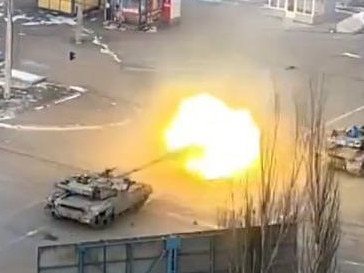
Ukraine has also regained control of Makariv, a town 65km west of the capital, where the “state flag of Ukraine was raised over the city” as the Russians retreated, the armed forces said in a statement.
The Pentagon believes 10 per cent of Russian forces in Ukraine have been destroyed, with some suffering frostbite.
Ukraine’s army command said Russian troops only have enough ammunition, food and fuel to last until the weekend and there are reports of hundreds of Russian soldiers defecting.
Moscow and Kyiv have resumed peace negotiations, with Russia wanting “more substantial” discussion and Ukraine President Volodymyr Zelenskyy confirming all issues would be on the table if Mr Putin agreed to direct talks.
“We continue to work at various levels and to push Russia for peace. It’s very difficult. Sometimes scandalous. But step by step we are moving forward,” he said.
That included Ukraine giving up its NATO membership aspirations.
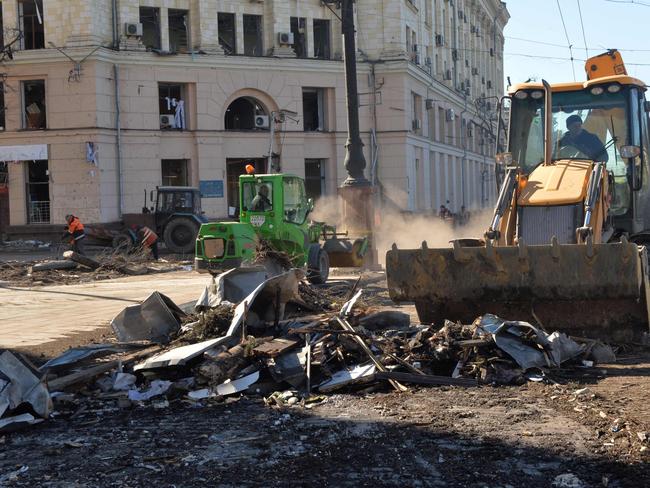
Mr Zelenskyy said he would still demand complete withdrawal of Russian forces from his country and international commitments to Ukraine’s security.
It comes as two “super-powerful bombs” rocked Mariupol on Tuesday as Ukrainian authorities made a fresh attempt at rescuing civilians from the besieged port city, which has suffered relentless shelling since Russia’s invasion began almost a month ago.
More than 200,000 people are trapped in the strategic city described by those who managed to escape as a “freezing hellscape riddled with dead bodies and destroyed buildings”, Human Rights Watch said, quoting figures provided by a local official.
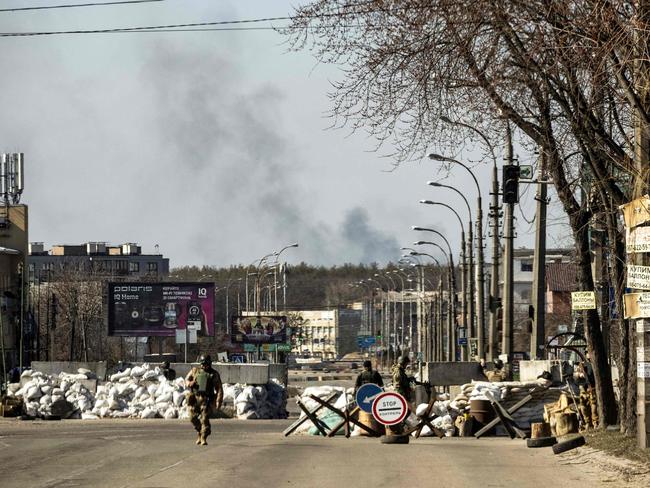
The“super-powerful bombs” slammed into the city even as rescue efforts were ongoing, said Mariupol local authorities,
Mr Zelenskyy said more than 7000 people had escaped in the last 24 hours alone, but one group travelling along an agreed humanitarian route west of the city were “simply captured by the occupiers.”
He warned that many thousands more were unable to leave as the humanitarian situation worsens.
United Nations chief Antonio Guterres called for Russia to end its “absurd war.”
“Even if Mariupol falls, Ukraine cannot be conquered city by city, street by street, house by house,” he said.
“This war is unwinnable. Sooner or later, it will have to move from the battlefield to the peace table. That is inevitable.”
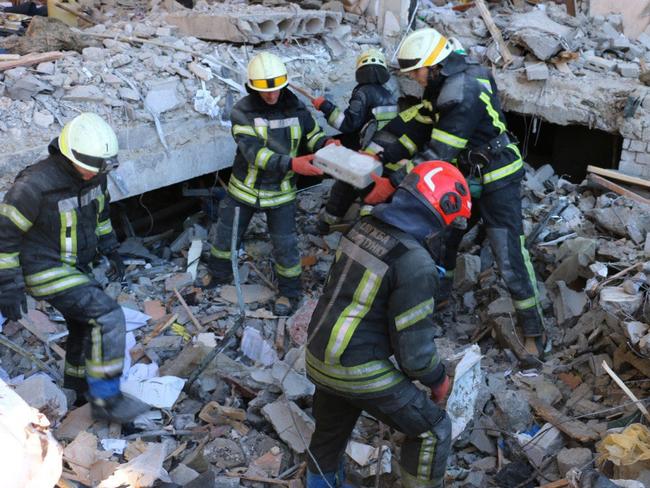
US President Joe Biden, preparing to visit Europe this week, said “Putin’s back is against the wall”.
“And the more his back is against the wall, the greater the severity of the tactics he may employ.”
Kremlin spokesman Dmitry Peskov responded Russia would use nuclear weapons only if under “existential threat.”




